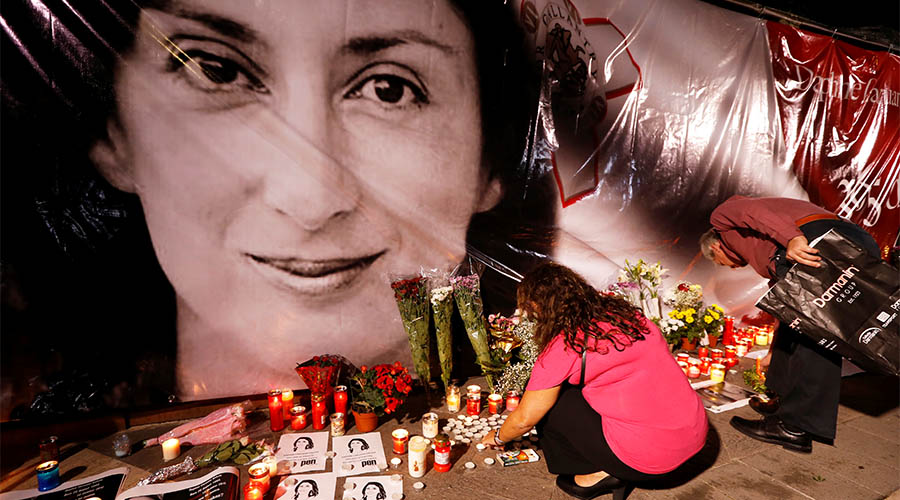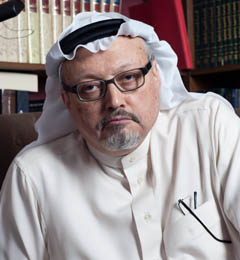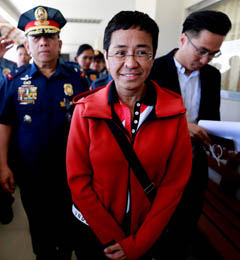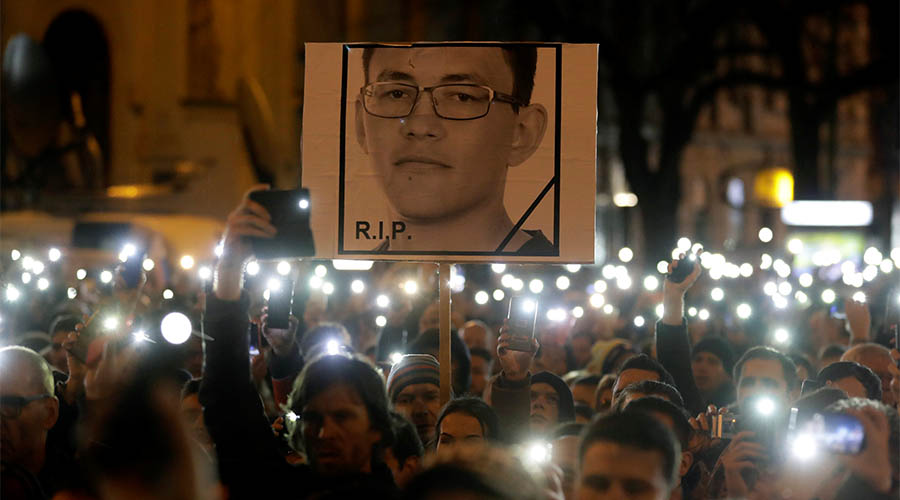The fight for media freedom
Ruth Green, IBA Multimedia JournalistThursday 9 April 2020

With the frequency of attacks on journalists growing exponentially, Global Insight assesses the myriad challenges facing those who seek to protect the freedom of expression worldwide.
A free media is among the fundamental hallmarks of a society governed by the rule of law. Yet, journalists – and those who defend them – are increasingly being targeted simply for doing their jobs. The murders of Daphne Caruana Galizia, Jamal Khashoggi, Ján Kuciak and countless others has caused international outrage and prompted calls to end impunity for crimes against the media.
According to the United Nations’ latest figures, nearly 500 journalists died worldwide between 2014 and 2018 – an 18 per cent increase on the preceding five years. Though fewer journalists are covering conflicts, perturbing statistics reveal that the number of media workers being harassed, arbitrarily detained, targeted or murdered continues to rise. More journalists are being killed in countries at peace than in war zones.
As a response to the growing range of threats against journalists, in 2019 the Canadian and UK governments set up a High Level Panel of Legal Experts (the ‘Panel’). Chaired by former UK Supreme Court President, the Rt Hon Lord Neuberger of Abbotsbury, it brings together 15 of the world’s leading media lawyers, judges and human rights experts. The Panel will provide advice and recommendations to governments worldwide on media freedom abuses.
Baroness Helena Kennedy QC is Director of the IBA’s Human Rights Institute, which is acting as the Panel’s Secretariat. She believes the growing number of journalists dying in the line of duty must prompt global leaders to take action. ‘We’re seeing, in places like Mexico, all over the Middle East, in parts of the Philippines, that attacks upon journalists now are growing exponentially and it should be a source of alarm to the free world,’ she says.
Amal Clooney, a leading human rights barrister at Doughty Street Chambers and the UK’s Special Envoy on Media Freedom, is Deputy Chair of the Panel. She tells Global Insight there needs to be much greater accountability for attacks on the media. ‘The thinking was that if world leaders are becoming more united, more determined, more innovative in finding ways to silence the press, shouldn’t defenders of the press do the same?’ she says. ‘Over the course of this year, the Panel will issue recommendations to governments on how to better protect journalists: by updating their laws to comply with international standards and by taking action against states that are clamping down on the press. If we don’t raise the cost of such behaviour, there is no reason to think it won’t continue.’
Baroness Kennedy says recent deaths, like that of 29-year-old Lyra McKee, who died in 2019 while covering unrest in Northern Ireland, are further proof of the growing threats facing the media in all countries. ‘We are living in a world where non-state actors can be very active in some of these abuses against journalists,’ she says. ‘For example, a young woman was shot in Northern Ireland only last year. The concerns about journalists and the protections that journalists require are ones that should be concerning us all, even those of us who live in societies where the greatest egregious wrongs don’t normally take place.’
Alinda Vermeer, Acting CEO of London-based Media Legal Defence Initiative (MLDI), agrees that the challenges facing journalists have never been greater. ‘We see that press freedom has deteriorated around the world, not just in the countries where we may historically have expected this, but also in certain democracies that were always known as “bastions of press freedom”’, she says.
Since its inception in 2008, MLDI has provided emergency financial and legal support to journalists, participated in strategic litigation and delivered training to media lawyers on the ground in over 50 countries. The organisation took on 119 new cases in 2019, bringing its total caseload for the year up to 332, spanning 65 countries. Vermeer says there are a number of reasons for this increase. ‘A larger variety of threats – not just legal – in combination with numerous styles of journalism and new forms of repression, has led to a larger amount of threats on the whole,’ she says. ‘We are seeing an increasing rise in populism, which has put pressure on the independent media, and have seen explicit attempts to silence critical media actors or exclude journalists from places where news is developing. There are so many new forms of journalism, such as citizen journalists, who work through blogs or Facebook or other online platforms, and fact checkers. We’re increasingly seeing that regulation of the online space can be very problematic.’
Online crackdown
Governments are under immense pressure to regulate social media and other online platforms to protect citizens from harmful content and online harassment. However, efforts to regulate online spaces are raising renewed concerns for free speech as the number of countries imposing internet shutdowns and introducing vague, often repressive laws – even reintroducing criminal laws that had previously been abolished – is on the rise.

People lay flowers and candles at a makeshift memorial during a vigil and protest on the first anniversary of the car-bomb assassination of anti-corruption journalist Daphne Caruana Galizia, outside the Courts of Justice in Valletta, Malta, October 2018. REUTERS/Darrin Zammit Lupi
In July 2018, Uganda became the first country to introduce a social media tax, purportedly to reduce online gossip. Under the law, all citizens are required to pay 200 Ugandan shillings per day – equivalent to $0.05 – if they wish to access 60 online platforms and mobile apps, including Facebook, Instagram, Twitter, and WhatsApp. Catherine Anite is Founding Director of the Freedom of Expression Hub, which is based in Uganda and works all across Africa promoting freedom of expression. Anite says the tax is widely viewed as an example of growing efforts by governments to silence critics, including the media. ‘The president was clear about it when he said there’s too much rumour-mongering on social media, so Ugandans must pay,’ she says. ‘Now this trend is spreading. Previously it was easy to gag journalists offline. The online, virtual space is quite huge, so now what governments are doing is coming up with laws that control rather than regulate online speech.’
We can see that it’s not just a problem in one country, it’s a systemic approach by all governments to have greater control over the internet, even if it’s often explained as a means to purge society of disinformation
Galina Arapova
Director, Mass Media Defence Centre
Anite, who has been appointed to the High Level Panel, is working on a report on misinformation and disinformation. ‘We are seeing a lot of different countries around the world coming up with these negative practices and drafting legislation that prohibits speech online,’ she says. ‘They are often extremely vague and go against international standards on best practices on freedom of expression. This report aims to encourage countries to decriminalise these laws that gag freedom of speech online.’
Galina Arapova, Director of the Mass Media Defence Centre in Voronezh, Russia, and another member of the Panel, believes the absence of established international rules on disinformation is enabling countries to impose laws that increasingly restrict journalists, and citizens more generally, online. ‘In 2018 there were something like 18 disinformation laws introduced across Europe,’ she says. ‘Russia has introduced its own more repressive law that limits press freedom a lot more than other countries. Ukraine is now discussing a draft law that may go even further, introducing criminal liability for spreading disinformation. This is a disturbing trend: we can see that it’s not just a problem in one country, it’s a systemic approach by all governments to have greater control over the internet, even if it’s often explained as a means to purge society of disinformation.’

Saudi journalist Jamal Khashoggi at his home, January 2016.
A new, wide-ranging Russian surveillance law, which came into force in November 2019, has raised alarm. The law requires domestic internet service providers to store metadata of all internet and mobile users using Russian Internet Protocol (IP) addresses, and install equipment that monitors internet activity.
It also enables Roskomnadzor, Russia’s telecommunications watchdog, to block access to content that the government deems a threat and entitles security services to access individuals’ metadata with no prior judicial authority.
‘No other country in the world has gone this far – it extremely limits privacy and freedom of speech,’ says Arapova, speaking to Global Insight from Voronezh over a secure, fully encrypted online platform. ‘All of this legislation is aimed at silencing critical voices and putting pressure on journalists, bloggers and activists so they do not create or disseminate information published by opposition media, which criticises the government.’
The notion of ‘fake news’ is often used by governments as a justification to censor or repress. But, fake news campaigns are also increasingly being used to undermine journalists’ work. Dario Milo, a partner who specialises in media, communications and information law at Webber Wentzel in Johannesburg, says the fake news campaign surrounding South Africa’s state capture investigation woke the country up to the dangers of disinformation. ‘Many journalists and prominent, experienced editors spoke out about how Twitter bots were using this disinformation campaign, and how it was disturbing their ability to do their work,’ he says.
Milo is also working on the Panel’s misinformation and disinformation report, alongside Anite and Arapova. ‘It illustrates how this kind of disinformation campaign, as well as the intimidation that often accompanies this, results in a “chilling effect” on investigative journalism. Many countries would label certain journalism as being fake news when, in fact, it’s a product of good quality journalism. It’s a huge problem in our democracy. One of the themes in our disinformation report will be how, if at all, we can start tackling that kind of propaganda against journalists.’
Attacks upon journalists now are growing exponentially and it should be a source of alarm to the free world
Baroness Helena Kennedy QC
Director, International Bar Association’s Human Rights Institute
Robert Balin is a media partner specialising in defamation and news gathering torts at Davis Wright Tremaine in New York, and was a contributor to the IBA book, Media Law & Ethics in the 21st Century (2014). He says that the challenge for governments, even in established democracies, is regulating online spaces to balance citizens’ rights. ‘Privacy and the internet are among the top issues that we’re all trying to grapple with as different legal systems try to figure out how to balance freedom of expression and the rights to privacy,’ says Balin, a member of the IBA Media Law Committee Advisory Board. ‘There is a debate going on right now in the US as to whether we should be regulating internet service providers more than we already do. The gatekeepers of speech are private companies. That’s the world that we live in right now.’
In Australia, tech and social media companies have voiced strong concerns that the country’s current defamation laws pose a risk to free speech, alleging that they effectively encourage platforms to censor content. Peter Bartlett, a partner at Minter Ellison in Melbourne and Vice-Chair of the IBA Legal Practice Division, says the laws are in drastic need of an update. ‘Australia’s defamation laws came into force in 2005, before the online environment changed the landscape,’ he says. ‘We still have the absurd situation where an article published in hard copy has a one-year limitation period, but the same article published online has no limitation period.’
Bartlett says the ongoing moves, spearheaded by the Attorney-Generals of Australia and New South Wales, to overhaul the country’s defamation laws are a welcome sign: ‘This has the support of media companies and many lawyers,’ he says. ‘There is far more attention being given in Australia to the erosion of freedom of speech over recent years. Lawyers have a very important role to play.’
Exposing the truth
Nobody doubts the importance of work undertaken by investigative journalists worldwide in holding governments, businesses, financial institutions and powerful individuals to account. Yet, the huge risks facing reporters and those who defend their rights make it ever more difficult. (See box: Lawyers in the firing line).
Lawyers in the firing line
As the threats facing journalists worldwide continue to rise, the risks posed to those who defend their rights are also increasingly acute. ‘There’s a trajectory which happens that once states start becoming authoritarian, or are authoritarian, they go after those who are their critics – the dissenters, the human rights activists,’ says Baroness Helena Kennedy QC, Director of the IBA’s Human Rights Institute. ‘They then, in turn, go after the journalists who report on those things and then they go after the lawyers who act in these kinds of cases. They go after judges who are genuinely independent, and are protectors of rights and of those freedoms that matter in a civilised society.’
Hina Jilani, a Pakistani human rights lawyer and former UN Special Representative of the Secretary General on Human Rights Defenders, knows all too well the immense challenges facing lawyers like herself who defend the rights of journalists. ‘In the first place there is total impunity for violations of human rights defenders in countries like Pakistan, which is very worrying,’ she says. ‘I myself have faced threats due to trying to protect the victims of my country’s very unfair blasphemy laws. But I only faced threats. There are lawyers who have actually been killed for defending the accused in blasphemy cases. The first problem for us is a sense that the impunity for human rights violations can continue with roots, regardless of the lack of social and public support for such impunity.’
Like journalists, many human rights lawyers are increasingly subject to death threats, harassment and intimidation. The annual Day of the Endangered Lawyer, this year celebrated on 24 January, focused on Pakistan. Jilani says there is still much work to be done in the country to safeguard the rights of journalists and lawyers who represent them. ‘The states do everything to keep it below the level of public awareness, and so we cannot generate the kind of sympathy and outrage that the killing of lawyers in blasphemy cases should instigate in the public,’ she says. ‘It’s important for us to gather these tools, to be able to make sure that institutions, like Parliament and even the judiciary, understand the need to be on the side of fairness and on the side of protecting the fundamental rights that the Constitution guarantees.’
In October 2017, Daphne Caruana Galizia, the journalist who fearlessly uncovered truths in Malta, was killed by a car bomb. Her death prompted an unprecedented constitutional and political crisis in the country, resulting in the resignation of Malta’s Prime Minister Joseph Muscat in December 2019. However, to date, nobody has been held accountable for her murder.
Just two months after Caruana Galizia was murdered, Reuters reporters Wa Lone and Kyaw Soe Oo were arrested and detained under the Official Secrets Act for reporting on the killing of ten Rohingya villagers in Rakhine State, Myanmar. They were finally pardoned in May 2019. Amal Clooney, who represented the journalists, says: ‘In too many places, those who commit the worst abuses are free, while those who report on those abuses are imprisoned. The Reuters journalists were told: drop the story and we will drop the charges. They refused to drop the story. But can we really expect all journalists to be so brave, to pay such a high price for telling the truth?’
Almost a third of the cases handled by the MLDI in 2019 related to corruption. Vermeer says it’s vital that journalists, particularly those working on difficult cases like these, seek legal advice. ‘Journalists often face threats alone, without any protection from media houses, or in the absence of a pro bono culture, so it would be fairly hard for them to access legal support or even find a lawyer that is willing to take on what are often very politically sensitive cases,’ she says. ‘We have an extensive pro bono network from around the world that can provide some support and international human rights law input. Support is out there and they should feel free to try and access that, rather than feeling intimidated and taking down content. In the build-up to Daphne Caruana Galizia’s murder, she was subject to a lot of different SLAPP – strategic lawsuit against public participation – suits and that is a very problematic situation.’

Rappler CEO and Executive Editor Maria Ressa is escorted by police after posting bail in Pasig Regional Trial Court in Pasig City, Philippines, March 2019. REUTERS/Eloisa Lopez
Balin believes media lawyers can play a pivotal role in helping journalists worldwide. ‘Ultimately, it’s about having lawyers in those countries that are trained and capable of working on these cases, so it’s not about simply parachuting a lawyer in, but international media lawyers can play a role in that process,’ he says.
A 2018 case in The Gambia is a prime example. The Court of Justice of the Economic Community of West African States (ECOWAS) delivered a landmark judgment in February 2018, which found that the government had violated the rights of four exiled Gambian journalists by enforcing laws criminalising speech, sedition and fake news. MLDI worked with a team of international and Nigerian lawyers representing the journalists. Balin, alongside David Kaye, the UN Special Rapporteur on the Promotion and Protection of the Right to Freedom of Opinion and Expression, filed an amicus brief on behalf of international freedom of expression NGOs who lent their weight to the case. ‘I continue to believe that regional courts are a real bulwark in the fight against government repression,’ says Balin. ‘Those kinds of fights continue and there is a special role that media lawyers play in these fights, often putting in front of the court briefs on behalf of news organisations or freedom of expression NGOs, in order to help educate courts around the world on best practices in the area of freedom of expression.’

Demonstrators light up their mobile phones as they take part in a protest rally marking the first anniversary of the murder of investigative reporter Jan Kuciak and his fiancée Martina Kusnirova in Bratislava, Slovakia, February 2019. REUTERS/David W Cerny
Regional and global momentum
Regional court rulings do have an impact, as illustrated by the growing number of countries decriminalising defamation across Africa. In 2014, the African Court on Human and Peoples’ Rights issued a landmark ruling that ordered Burkina Faso to award journalist Lohé Issa Konaté $70,000 in compensation, following his year-long detention for charges of criminal defamation.
‘That has been a first step for Africa,’ says Anite. ‘A few months later, we saw Burkina Faso changing its criminal defamation laws and removing prison sanctions. The next year, we saw Lesotho going one step ahead of the African courts and decriminalising defamation as a whole. In 2017, Kenya decriminalised defamation using the Konaté decision. Rwanda, which is a country that has been deemed to be suppressive to the media and journalists, decriminalised defamation on its own motion – so this is a great, positive trend. We hope that, with the work of the Panel advocating for countries to decriminalise laws that are not in tandem with international standards on freedom of expression, we’ll see more positive trends to come.’
The international legal community itself also has a vital role to play in upholding the rule of law and defending the rights of journalists worldwide, says Hina Jilani, a Pakistani human rights lawyer, member of the Elders and former UN Special Representative of the Secretary General on Human Rights Defenders. ‘Coming from a country like Pakistan, I know that sometimes there are so many repressions and restrictions on fundamental rights that we, inside the country, do need international mechanisms and voices to come and support us if we are in trouble inside Pakistan in terms of defending human rights,’ says Jilani, who also sits on the Panel. ‘That’s why these international initiatives have always been very important to me.’
If we don’t raise the cost of such behaviour, there is no reason to think it won’t continue
Amal Clooney
UK Special Envoy on Media Freedom and Deputy Chair, High Level Panel on Media Freedom
‘Media freedom is under attack in a big way in the world today,’ agrees Karuna Nundy, an advocate at the Supreme Court of India. Nundy, another member of the Panel, believes the time has come for lawyers worldwide to come together and defend the interests of journalists. ‘The problem is that without these people, we don’t know what our countries, what our marginalised people, what our women, what our climate is going through and we don’t know whether people’s most basic rights are being violated. This is why the work of this panel, I think, is particularly important, because there are people on there that are judges and are lawyers who have been committed to this work for a long, long time from all over the world. And we hope to bring something that governments will, I hope, be glad to implement.’
The Panel has an ambitious mandate and is focusing on issuing advice and recommendations on an extensive list of areas, including sedition, blasphemy and hate speech, defamation, misinformation and disinformation, anti-terrorism and public order, espionage and official secrets and other restrictions on the media relating to ownership, funding, licensing and the internet.
In February, the Panel published a report calling on governments to adopt targeted sanctions regimes to protect journalists, media professionals and others engaged in journalistic activities. Clooney, who authored the report, hopes that governments, ‘both those who are at war with the media and those that claim they are not’, will look to the Panel’s recommendations ‘to curb human rights abuses and do more to protect journalists around the world.’
Maria Ressa, Co-Founder of Rappler.com and journalist from the Philippines – one of the deadliest countries for journalists in the world – attended the report’s launch in London. She couldn’t have made a better case for why journalists like her need legal protections more than ever before. ‘As the world of journalism has gone through creative destruction, so has the rule of law and the profession of law,’ she told a packed room at Chatham House, having posted bail eight times to attend the event. ‘So please, give us new rules to protect us.’
